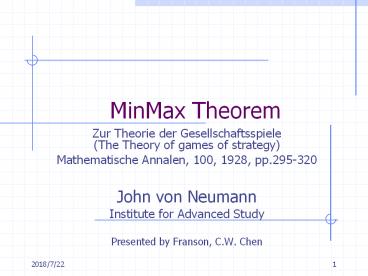MinMax Theorem - PowerPoint PPT Presentation
1 / 8
Title:
MinMax Theorem
Description:
Mathematische Annalen, 100, 1928, pp.295-320. John von Neumann. Institute for Advanced Study ... and (3), the conclusion of von Neumann is then that S1 can make ... – PowerPoint PPT presentation
Number of Views:48
Avg rating:3.0/5.0
Title: MinMax Theorem
1
MinMax Theorem
- Zur Theorie der Gesellschaftsspiele(The Theory
of games of strategy) - Mathematische Annalen, 100, 1928, pp.295-320
- John von Neumann
- Institute for Advanced Study
- Presented by Franson, C.W. Chen
2
MinMax Theorem
- In any finite, two-player, zero-sum game,
in any Nash equilibrium each player receives a
payoff that is equal to both his maxmin value and
his minmax value.
3
- A two players zero-sum game.
- The value of g(x, y) is being tugged at from two
sides, S1 and S2. - Player S1 controls the variable x, and wants to
maximize g(x,y) Player S2 controls the variable
y, and wants to minimize g(x,y).
4
If S1 chose the number x0 (x0 ? 1, 2, ...,
), that is the strategy x0, his result g(x0,
y) would then also depend on the choice of S2
but no matter which choice (y) S2 comes up with,
the following inequality holds
(1)
5
Now if we suppose that S2 knew x0, S2 would
according to the assumptions in the model choose
y y0 such that
(2)
Facing this situation the best thing for S1
would be to choose x0 such that
(3)
6
According (1) and (3), the conclusion of von
Neumann is then that S1 can make
(4)
independently of the choice of S2. The same
argument holds for S2, which can make
(5)
no matter what strategy x, S1 chooses.
7
From this von Neumann concluded that if a
pair of strategies x0, y0 can be found for which
(6)
then that would necessary be the choices for S1,
and S2 respectively, and would be the value
of the game.
8
Saddle Point































